 TV
TV « In Which We Were Jewish Once And Young »
 Tuesday, March 28, 2017 at 11:28AM
Tuesday, March 28, 2017 at 11:28AM 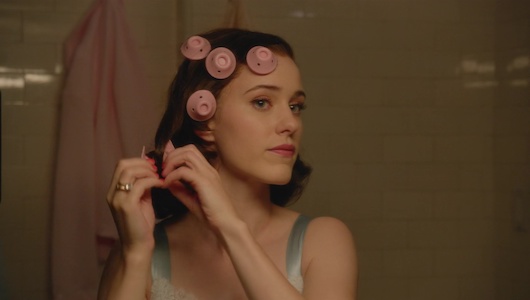
Passed Over
by ETHAN PETERSON
The Marvelous Mrs. Maisel
creator Amy Sherman-Palladino
Amazon Studios
 Until she takes the stage Midge (Rachel Brosnahan, House of Cards) is unlike any character we have ever seen before on television. Her outward face, delicately applied during the early morning while her husband believes her to be asleep, is that of a Manhattan housewife whose parents (Marin Hinkle, Tony Shalhoub) live floors above her in the same building. Her two children consist of a young boy named Ethan who may be autistic and a baby with a massive head. Her husband Joel (Michael Zegen) depends on her completely, and so when he announces he is leaving, we are not the least bit surprised.
Until she takes the stage Midge (Rachel Brosnahan, House of Cards) is unlike any character we have ever seen before on television. Her outward face, delicately applied during the early morning while her husband believes her to be asleep, is that of a Manhattan housewife whose parents (Marin Hinkle, Tony Shalhoub) live floors above her in the same building. Her two children consist of a young boy named Ethan who may be autistic and a baby with a massive head. Her husband Joel (Michael Zegen) depends on her completely, and so when he announces he is leaving, we are not the least bit surprised.
Midge measures her calves and thighs, and claims she goes through this intense process on a weekly basis for ten years. When she cooks, it is with a hat that a woman twenty years older would be far more comfortable in. In other words, she is not really comfortable with herself at all.
We saw far more of truly ethnic portrayals of Jews in decades past. Most were contrived by Woody Allen, who did the work of the ADL in showing that traditional stereotypes about the characters of Jewish people were sometimes true, sometimes false. The ways in which they were true were charming personality quirks which allowed them to survive the difficulties if their lives as American immigrants, Allen explained, and the ways in which they were false painted Jewish-Americans as hard-working, patriotic citizens in therapy for the rest of their lives.
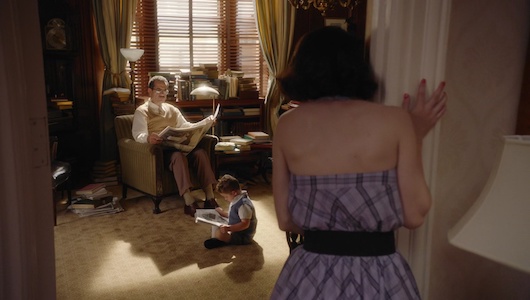
Midge Maisel is also somewhat religious – she refuses to eat nuts in the early morning of Yom Kippur, for example. It will be intriguing to see if she leaves her religion behind as The Marvelous Mrs. Maisel goes to series, since almost every white person we see on the small screen has zero relationship with religion of any kind. Amy Sherman-Palladino's father was Jewish, and to some extent her ways of speaking have always been rooted in the cultural and environmental proximity that forced Jews to adapt by talking quite a bit.
It is strange that the women Sherman-Palladino writes so well for rarely struggle with poverty. But then, few shows on television deal with this theme in general. There was a time in the past where Rory and Lorelai were really living hand-to-mouth, and I will never forget the astonishing episode when Lorelai's mother viewed the place her daughter and granddaughter were living all that time. Lorelai made it, however, and hopefully The Marvelous Mrs. Maisel will show us what it takes a single mother to survive on her own.
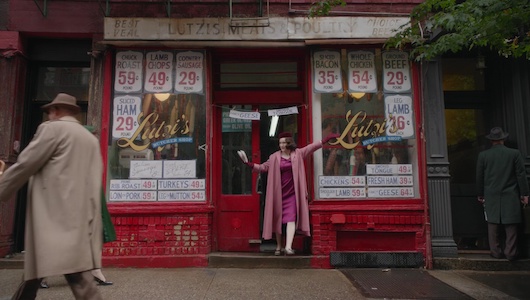
Sherman-Palladino has never received sufficient credit for the amount of visual perfection she achieves in her hour-long dramas. Gilmore Girls had a wonderful camera and the small Connecticut town of Star's Hollow where Rory turned into such a tragic figure was particularly evocative. On her short-lived masterpiece Bunheads, she gave us the porcelain charm of California, although we were unfortunate to spend so little time there. Given the task of creating New York in the late 1950s, Sherman-Palladino spares no expense in detailed stormfronts and meticulously wrought apartments. She never forces her characters to inhabit anything less than a fully realized world.
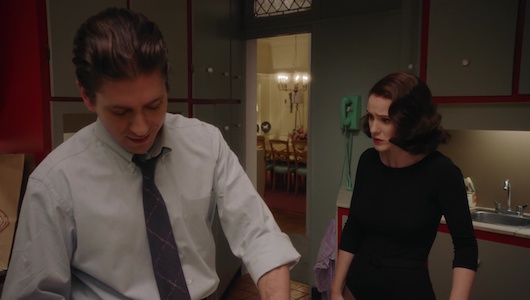
After her husband peaces out, Midge takes up a stand-up career of her own. She is not completely terrible, but it is still hard to watch stand-up routines written for other people. Even being forced to view her husband stealing wretched Bob Newhart bits feels like an excruciating waste of time.
It would be better not to have to watch her perform at all, since her life off-stage is so much more exciting than what she explains of herself when she is on it. Her struggle relating to her children seems a mere proxy for her inability to directly address the world at large in something other than a costume. We completely understand why her husband left her, and we are surprised that he even made it this far. What kind of person toasts herself at her own wedding? We are wanting desperately to find out.
Ethan Peterson is the reviews editor of This Recording.
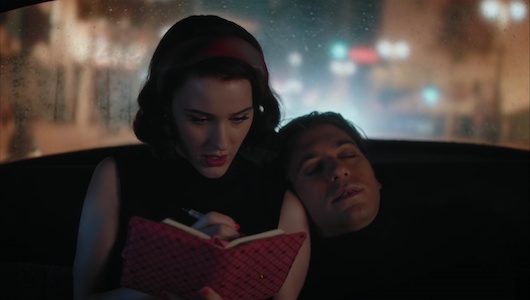






























Reader Comments